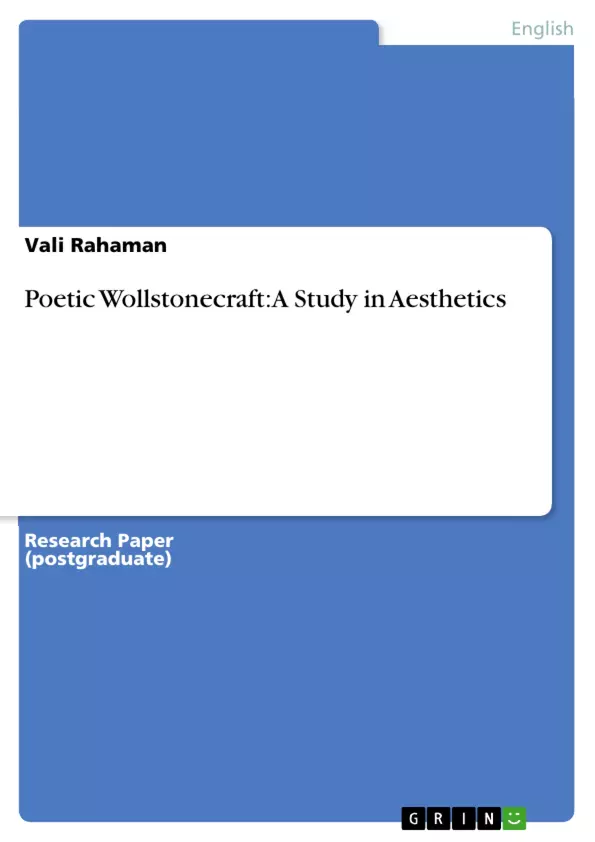Poetic Wollstonecraft: A Study in Aesthetics, an essay, discusses principles of Romantic aesthetics in Marry Wollstonecraft writings.Mary Wollstonecraft, a classic in the world of feminist, had viewed also on beauty and sublimity of /in art and literature. She was a born genius, though never composed poetry. Her heart's revelation can be found in some incomplete dramas, fictions, letter and polemical writings like A Vindication of the Rights of Man/Woman . She had to suffer after the birth of her daughter, Fanny, Imlay’s deception. She was never disheartened, though she committed unsuccessful suicidal attempt twice. After each attempt she found herself a unique creative energy and sympathetic touch with the poor and helpless which made her anti-aristocratic, anti-imperialistic, anti-anarchist, and anti-non-humanist/humanitarianist. She developed Enlightenment revolution of woman's rights and freedom. Her modesty and chaste charity was always inclined to the poor and helpless creatures of the country, esp. women...
Inhaltsverzeichnis (Table of Contents)
- Influence of Aristotle's Poetics, Horace's Ars Poetica, and Longinus' On the Sublime
- English aesthetics and literary criticism
- Impact of leading philosophers and literary critics
- Wollstonecraft's Attack on Class and Gender-Oriented Thinking
- Burke's views on beauty and sublime
- Wollstonecraft's critique of Burke's perspective
- Wollstonecraft's 'Poetic' Temperament
- Advocacy for imagination and naturalism
- The concept of the poet as a gifted and peculiar individual
- Elucidation of the Term 'Poetic' in Wollstonecraft's Aesthetics
- The relationship of consciousness with its object
- The significance of imaginativeness and perceptibility in language
- Wordsworth's perspective on the 'poetic' in writing
Zielsetzung und Themenschwerpunkte (Objectives and Key Themes)
This paper explores Mary Wollstonecraft's aesthetic views on poetry, the poet, and beauty. It examines her contributions to the understanding of aesthetics within the context of the broader history of Western literary criticism, with a particular emphasis on her critiques of traditional and hierarchical notions of taste and beauty.
- Wollstonecraft's aesthetics as a feminist critique of established ideas of beauty and sublime
- The role of imagination and spontaneity in aesthetic experience
- The concept of the 'poetic' in Wollstonecraft's thought
- The impact of major aesthetic thinkers such as Burke, Aristotle, and Longinus on Wollstonecraft's views
- The significance of Wollstonecraft's contributions to feminist and aesthetic theory
Zusammenfassung der Kapitel (Chapter Summaries)
The paper begins by establishing the historical context of Wollstonecraft's aesthetic thought, exploring the influence of major figures like Aristotle, Horace, and Longinus on English literary criticism. It then focuses on Wollstonecraft's critique of Edmund Burke's views on the sublime and the beautiful, highlighting her rejection of traditional, class-bound perspectives on aesthetics. The discussion proceeds to analyze Wollstonecraft's "poetic" temperament, emphasizing her advocacy for imagination, naturalism, and the individuality of the poet. The paper concludes with an exploration of the term "poetic" within Wollstonecraft's framework, examining her views on the relationship between consciousness and its object and the significance of imaginativeness in language.
Schlüsselwörter (Keywords)
This paper explores the key concepts of feminist aesthetics, beauty, sublime, poetic, imagination, spontaneity, and the role of individual experience in the formation of aesthetic judgment. It also examines the influences of key figures like Aristotle, Horace, Longinus, Burke, and Wordsworth on Wollstonecraft's aesthetic thought.
Frequently Asked Questions
What is the main focus of "Poetic Wollstonecraft: A Study in Aesthetics"?
The essay explores Mary Wollstonecraft's aesthetic views on poetry, beauty, and the sublime, positioning her work as a feminist critique of established Romantic and Enlightenment ideas.
Did Mary Wollstonecraft ever write poetry?
No, she never composed formal poetry, but her "poetic" temperament and creative energy are found in her dramas, fictions, letters, and polemical writings like "A Vindication of the Rights of Woman."
Which classical thinkers influenced Wollstonecraft's aesthetics?
Her work was influenced by the principles of Aristotle's Poetics, Horace's Ars Poetica, and Longinus' On the Sublime.
How did Wollstonecraft critique Edmund Burke's views on beauty?
She rejected Burke's traditional, class-bound, and gender-oriented perspective on the sublime and the beautiful, advocating instead for a more humanitarian and egalitarian aesthetic.
What role does imagination play in Wollstonecraft's thought?
Wollstonecraft advocated for imagination and spontaneity as central elements of the aesthetic experience and the individuality of the poet.
- Arbeit zitieren
- Vali Rahaman (Autor:in), 2010, Poetic Wollstonecraft: A Study in Aesthetics, München, GRIN Verlag, https://www.grin.com/document/152503



